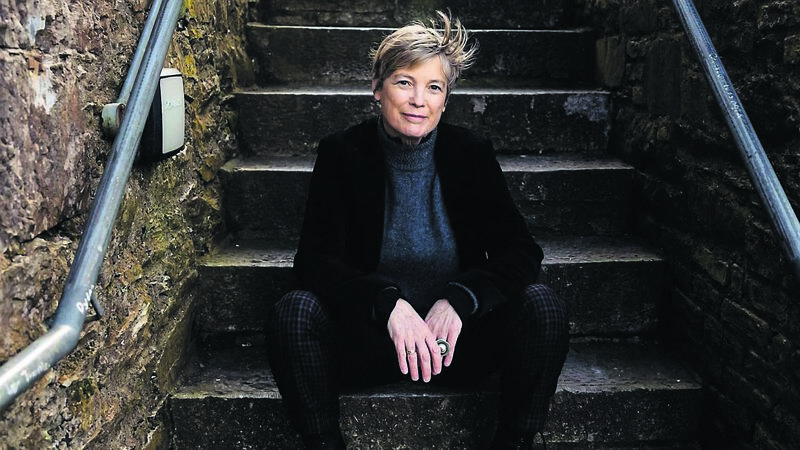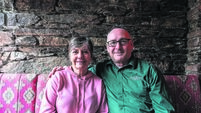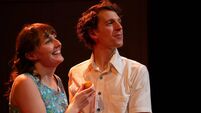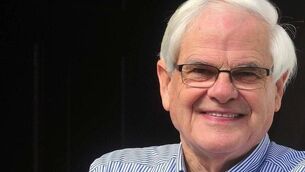Cork author puts a new 'slant' on gay life in debut novel

Katherine O’Donnell, a Cork-born graduate of UCC, and author of the new book, Slant. Pictures: Emma Jervis
CORK-born Katherine O’Donnell’s stellar career and busy life has just been bolstered by a new venture, the publication of her debut novel.
Slant is about a character called Ro McCarthy who is living in Boston in the 1980s as an undocumented worker, doing cleaning jobs and looking after an elderly Jewish woman.
Ro fled her civil service job in Dublin and finds solidarity and fun within the large undocumented Irish community in the U.S city where she enrols part-time at the University of Massachusetts.
She falls for a British Fulbright scholar called Jenny and later becomes involved with an older woman. Life is good, if somewhat complicated emotionally - until the onset of the Aids epidemic which affects her gay male friends.
Katherine, who was born in the mid-1960s and spent her childhood on the Naval base at Haulbowline where her father was a Naval officer, says her novel isn’t autobiographical, although it draws on what she observed as a young woman on a Fulbright scholarship at Boston College in the ’80s.
A big fan of the short story, Katherine realised that some stories she was working on while at Oxford for a year, were the makings of a novel. And so, Slant was born.
It’s a great read with broad appeal, despite its gay protagonist. Katherine, who came out before moving to the U.S, says three male readers in their seventies, who are grandfathers, loved the book.
Professor of the history of ideas in the philosophy department at University College Dublin is Katherine’s day job, which she describes as “wonderful”.
It looks at ideas and concepts such as democracy, the meaning of gender, the meaning of the State, and other everyday realities, and the contexts from which they emerged.

In 2016, the year Katherine went to Oxford for research purposes, she was “quite burnt out and mentally exhausted” from her advocacy work with ‘Justice for Magdalenes’. She ended up standing in as a lecturer for a feminist philosopher at the university who became seriously ill.
“That took me out of research,” she says.
I started writing short stories in my spare time but because I was so fried, I didn’t finish them properly.
“As I was teaching one lovely spring afternoon, I saw two young people from the seminar across a lovely big hardwood table in a grand Georgian room just fall in love with each other. There was instant attraction. I thought, I’d love to be able to write that.
“Also, at the time, it was Brexit Britain, leading up to the referendum. I hated all the discourse around economic migrants with headlines such as ‘EU doctors taking our jobs’. I wanted to write a story reminding Irish people that we sent many people abroad in the ’80s and ’90s.
“I wanted to write about a loveable economic migrant working illegally in Boston. So those stories rolled into one and became a novel.”
The story is set about six years before Katherine was in Boston.
A graduate of UCC, Katherine studied journalism and worked at RTÉ on the Aertel teletext service for about two years before embarking on her academic career.
Asked why she left journalism, Katherine says: “I wasn’t any good at it to be honest. There is the speed. I liked the accuracy though. But I think I was too young. It was a couple of days before my 21st birthday when I joined RTÉ. I was smart, but I just didn’t have the background knowledge.
“The reason academia suits me much better is because my personality means I like spending an awful lot of time verifying things and proving things, expecting quite a sceptical reader.”
On top of the Fulbright scholarship, Katherine won a scholarship to Berkeley University in California where she spent two years, followed by a stint in Toyko. She says that part of the reason she returned to Ireland was the election in 1990 of Mary Robinson as President.
“It was the first time Irish women had voted as a class,” Katherine says. “I was very excited by Mary Robinson. It was a turning point. Change was afoot.
We had lost everything in the 1980s, all the referenda and the awful things that happened with impunity such as Ann Lovett’s death, the Kerry babies, the murder of gay men. It was an unrelentingly grim time.
Katherine had been toying with the idea of staying in the U.S.
“But the systems there are too unfair,” she says. “There isn’t an adequate distribution of resources. Here, we have a really good social welfare model.
“I wanted to live in a fair country and to be part of making positive change here. And I love Ireland... I think we should cherish what we have and try and make it better.
“I don’t operate from fear because in my job, I get to work with people in their late teens and early twenties. I can tell you, and I know from talking to academics across Ireland, the future is in good hands because of these amazing people.”
Coming out as a gay woman in Ireland back in the 1980s was challenging.
“I was pretty forthright with everyone, but people didn’t want to talk to me about it,” says Katherine. “There were veils of discretion drawn.
“But it has been joyful and wonderful. Dealing with homophobia is hard.
Being lesbian is just glorious. I’ve had a huge amount of luck and privilege in my life. It’s much tougher when you’re a kid getting beaten up every day.
“Homophobia can be extraordinarily toxic and virulent. I’ve been lucky that I haven’t had to bear the brunt of it.”
Slant is published by New Island Books. €16.95.







 App?
App?


